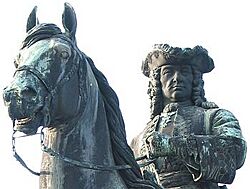Ludwig Andreas von Khevenhüller facts for kids
Quick facts for kids
Ludwig Andreas Khevenhüller, Count von Aichelberg-Frankenburg
|
|
|---|---|

Field-Marshal Khevenhüller, part of the Maria Theresia monument in Vienna
|
|
| Born | 30 November 1683 Linz |
| Died | 26 January 1744 (aged 60) Vienna |
| Allegiance | |
| Service/ |
Imperial Army |
| Rank | Generalfeldmarschall |
| Battles/wars | Great Turkish War
War of the Spanish Succession
War of the Quadruple Alliance
War of the Austrian Succession
|
| Awards | Order of the Golden Fleece, 1744 |
Ludwig Andreas von Khevenhüller (born November 30, 1683 – died January 26, 1744) was a very important Austrian general. He became a Field marshal, which is the highest rank in the army. He was known for his clever strategies and bravery in many battles.
Contents
Early Life and Family Background
Ludwig Andreas was born in Linz, a city in Austria. He came from a very old and respected family called the House of Khevenhüller. This noble family originally came from a region in Germany called Franconia. Later, they settled in Carinthia, which is a part of Austria. His father was Count Franz Christoph von Khevenhüller-Frankenberg-Aichleberg, and his mother was Countess Faustina Barbara Montecuccoli.
A Military Career Begins
Ludwig Andreas started his military career under a famous general, Prince Eugene of Savoy. This was during the War of the Spanish Succession. By 1716, he was put in charge of Prince Eugene's own group of dragoons, who were soldiers who fought on horseback.
He showed great skill and courage in battles. He was especially noted for his actions at the Battle of Peterwardein in 1716 and the Siege of Belgrade in 1717. Because of his success, he quickly moved up the ranks. In 1723, he became a General-Feldwachtmeister, which is like a major general. By 1733, he was a Feldmarschalleutnant, similar to a lieutenant-general.
Key Battles and Leadership
In 1734, Ludwig Andreas was back on the battlefield during the War of the Polish Succession. He fought in the Battle of Parma. When the Austrian commander, Count Mercy, was killed, Khevenhüller took over the army in Italy. He led the troops until another general, Field Marshal Königsegg, arrived.
He again showed his bravery at the Battle of Guastalla in 1734. After this battle, he was once more in command. His smart leadership helped him earn the rank of General of Cavalry. He continued to serve in Italy, both in military and diplomatic roles, until the war ended.
Becoming a Field Marshal
In 1737, Ludwig Andreas von Khevenhüller was promoted to Field marshal. Prince Eugene of Savoy, who was a very experienced general, told the ruler that Khevenhüller was the best general in their service.
During the war against the Ottoman Empire that followed, Khevenhüller had a major achievement at the Battle of Radojevatz in 1737. He managed to fight his way through a much larger Turkish army, which was a very difficult task. Later, he also helped manage the army's budget and was made commander of the Vienna garrison, which is the group of soldiers protecting Vienna.
Success in the War of the Austrian Succession
Ludwig Andreas truly shined during the War of the Austrian Succession. He was the main commander of the army along the Danube River. In January 1742, he quickly drove out the French and Bavarian invaders from Austria. He did this with fast marches and sharp battles.
He then took control of southern Bavaria and captured the city of Munich. He even forced a large French army in Linz to surrender. Later that year, he had to leave some of the areas he had conquered because he didn't have enough soldiers. However, in the next campaign, he helped reconquer southern Bavaria. He also forced the emperor to agree to the Convention of Nieder-Schönfeld, which was not a good deal for the emperor.
Khevenhüller did not agree with the plan to advance beyond the Rhine River, and it turned out he was right. The Austrian army had to retreat. But Khevenhüller managed this retreat with amazing skill, keeping his soldiers safe.
Later Life and Legacy
When he returned to Vienna, Maria Theresa, the ruler of Austria, honored him with the Order of the Golden Fleece. This was a very high award. Ludwig Andreas von Khevenhüller died suddenly in Vienna on January 26, 1744.
Military Writings
Khevenhüller also wrote several books and guides for officers and soldiers. These included "Observationspunkte für sein Dragoner-Regiment" (which means "Observation Points for his Dragoon Regiment") and a guide for infantry soldiers. He also wrote two important books about war in general, called "Kurzer Begriff aller militärischen Operationen" ("Short Concept of All Military Operations") and "Ideen vom Kriege" ("Ideas on War"). These writings showed his deep understanding of military strategy.
Images for kids
 | Bayard Rustin |
 | Jeannette Carter |
 | Jeremiah A. Brown |


